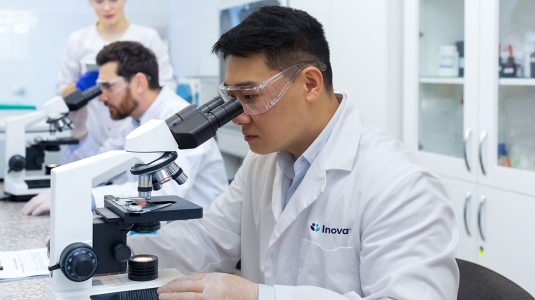The Inova Hematology Program at the Inova Schar Cancer Institute focuses on diagnosing and treating both blood cancers and non-cancerous blood disorders. Our team of board-certified specialists is experienced in managing malignant and benign hematology conditions, as well as sickle cell disease. We offer advanced treatments, including chemotherapy and immunotherapy, and collaborate to develop personalized care plans using the latest technology and research.
- Acute lymphocytic leukemia
- Acute myelogenous leukemia
- Amyloidosis
- Anemia
- Antiphospholipid syndrome
- Aplastic anemia
- Autoimmune hemolytic anemias
- Autoimmune thrombocytopenia
- Benign hematologic conditions
- Bleeding disorders
- Castleman disease
- Chronic lymphocytic leukemia
- Chronic myelogenous leukemia
- Chronic myelomonocytic leukemia
- Cryoglobulinemia
- Cutaneous T-cell lymphoma
- Essential thrombocythemia
- Fanconi anemia
- Hairy cell leukemia
- Hemoglobinopathies
- Hemophilia
- Hereditary hemolytic anemias
- Hodgkin's lymphoma (Hodgkin's disease)
- Hypereosinophilic syndrome
- Immune thrombocytopenia (ITP)
- Iron deficiency anemia
- Large granular lymphocyte disorders
- Leukemia
- Lymphoma
- Macroglobulinemia
- Monoclonal gammopathy of undetermined significance (MGUS)
- Multiple myeloma
- Myelodysplastic syndromes
- Myelofibrosis
- Myeloproliferative disorders
- Natural killer cell leukemia
- Non-Hodgkin's lymphoma
- Osteosclerotic myeloma
- Paroxysmal nocturnal hemoglobinuria
- POEMS syndrome
- Polycythemia vera
- Sickle cell anemia
- Systemic mastocytosis
- Thalassemia
- Thrombocytosis
- Vitamin deficiency anemia
- Von Willebrand disease
- Waldenstrom macroglobulinemia
- White blood cell disorders


